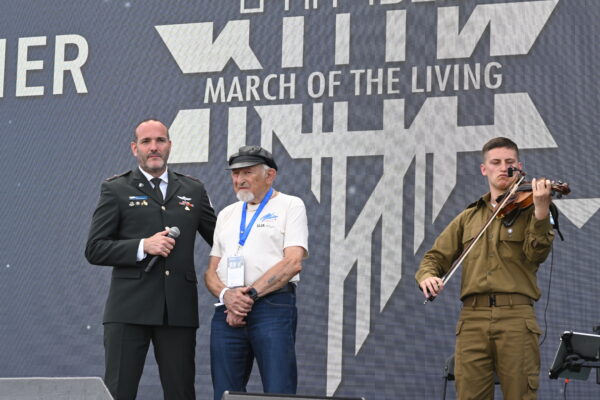
Rivlin, right, walks past an honor guard with Poland’s President Andrzej Duda, at the President’s Residence in Jerusalem, January 17, 2017. Sebastian Scheiner/AP
Poles who took part in the murder of Jews in pogroms around World War II expelled themselves from the Polish people, Polish President Andrzej Duda said Tuesday at the start of a state visit to Israel.
In a meeting with his Israeli counterpart Reuven Rivlin, Duda spoke of the pogrom in the city of Kielce in the summer of 1946, after the war, during which a mob murdered 42 Holocaust survivors and injured dozens of others.
“The members of my people who took part in the pogrom in Kielce after the end of World War II expelled themselves from the Polish people. That is my deep personal conviction,” Duda said, adding: “Anyone who expresses anti-Semitic ideas in Poland is like a person who steps on a grave − a despicable act in Polish culture.”
These statements, coming from a president also a member of the ruling right-wing Law and Justice Party, are significant in Poland. Many Poles, including some in the government, deny that some Poles took part in the murder of Jews around World War II.
According to Duda, “history is sometimes hard. We study it and try to discover facts. The facts are complicated.” Without elaborating, he added: “After all, there were also provocations that in the end led to certain incidents.”
He also mentioned claims on the right that the murder of Jews in Kielce was instigated by the Russians, who occupied Poland after the war. But he added that “human dignity is the supreme value that should not be influenced by any provocation.” According to Duda, “not everyone is able to show courage, but human decency must be demanded of every person.”
Duda, however, said nothing about the 1941 pogrom in Jedwabne, where hundreds of Jews were murdered by their Polish neighbors. Today this event remains a controversy in Poland; some Poles blame the Nazi German invaders.

Polish President Andrzej Duda speaking in Jerusalem, January 17, 2017.Gali Tibbon / AFP
In 2015, Duda and his predecessor Bronislaw Komorowski clashed over the issue. In a televised debate, Duda argued that because of Komorwski, who apologized for Polish crimes in Jedwabne, Poles in the town were “being falsely accused by others of participating in the Holocaust.”
Later, in Rivlin’s speech at a dinner in honor of his Polish counterpart, he commented on the way Warsaw was shaping the memory of the Holocaust.
“Israel is closely following the academic and political debate in Poland over the issue of remembrance and responsibility, and it admires Polish society’s self-scrutiny and soul-searching,” he said.
“We haven’t always agreed, but we’re confident that Poland will continue to be committed to comprehensive, unrestricted research about events and processes during the Holocaust period.”
Rivlin said he has always believed that statesmen have an obligation to shape the future and to shape history, whereas historians have an obligation to describe the past and study history. It’s preferable that one not intrude on the other’s turf, he added.
Earlier in the day, Rivlin did not mention Polish pogroms against Jews but said he realized that “alongside the close historical ties” between Israel and Poland, a past that was “rich, complex and painful” had to be courageously confronted.
In 2014, in a speech at the opening of Warsaw’s Museum of the History of Polish Jews, Rivlin mentioned Jedwabne, saying the revelation of Polish crimes there had led “the Polish community to thoroughly explore its past.”
Rivlin added that “Polish society becomes more and more courageous … on a day-by-day basis, in confronting its past and its future,” and that “only through this kind of courage shall we be able to write – and we have already started that process – a new, promising chapter of our mutual history.”
On Tuesday, Duda mentioned “the German invasion of Poland and what happened afterward in the occupied areas by the Nazis, in that same death factory and Holocaust that so powerfully struck the Jewish people and extracted a high price from the Jewish people. But that was also the impetus for building a strong and secure state in whose construction many Jews born in Poland took part.”
At Mount Herzl in Jerusalem, Duda visited the grave of Yoni Netanyahu, the brother of Prime Minister Benjamin Netanyahu who was killed in the 1976 operation that freed Israeli hostages in Entebbe, Uganda. Following Jewish tradition, Duda placed on the grave a stone that he had brought with him from the neighborhood that once housed the Warsaw Ghetto.
“President Duda said he knows the story of Yoni, of blessed memory, and added that he is a hero for all humanity,” Duda’s press people said in a statement.
Later Tuesday, Duda was to visit the Yad Vashem Holocaust memorial.
Originally published HERE








